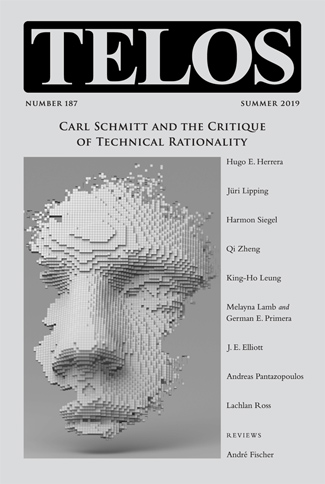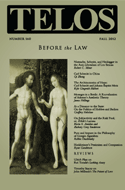By Qi Zheng · Wednesday, July 24, 2019 Qi Zheng’s “Carl Schmitt, Justice of War, and Individual Citizen’s Obligation” appears in Telos 187 (Summer 2019). Read the full article at the Telos Online website, or purchase a print copy of the issue in our online store. Individual subscriptions to Telos are available in both print and online formats.
 Carl Schmitt produced the original text of “The International Crime of the War of Aggression and the Principle ‘Nullum crimen, nulla poena sine lege‘” in 1945. The fundamental issue of the text concerns an individual citizen’s obligation in international law toward his national government in the event of an unjust war. Schmitt’s analysis of the issue is based on his perception of politics as the relationship between protection and obedience. However, his understanding of this relationship is not consistent with what he proposed in his other major works, i.e., that the relationship is a collective one. In order to support the argument in his 1945 text, Schmitt completely abandoned his collective understanding of the relationship and changed it to an individualistic understanding. This paper explores the subtle but important change in Schmitt’s argument. Carl Schmitt produced the original text of “The International Crime of the War of Aggression and the Principle ‘Nullum crimen, nulla poena sine lege‘” in 1945. The fundamental issue of the text concerns an individual citizen’s obligation in international law toward his national government in the event of an unjust war. Schmitt’s analysis of the issue is based on his perception of politics as the relationship between protection and obedience. However, his understanding of this relationship is not consistent with what he proposed in his other major works, i.e., that the relationship is a collective one. In order to support the argument in his 1945 text, Schmitt completely abandoned his collective understanding of the relationship and changed it to an individualistic understanding. This paper explores the subtle but important change in Schmitt’s argument.
This paper is divided into two sections. The first section reconstructs Schmitt’s arguments on an individual citizen’s right to resistance in international law. It focuses on two questions: whether an individual citizen has the right to judge the justice of war and whether individuals have an obligation in international law to disobey the government if they find that their government is conducting an unjust war. The second section examines Schmitt’s argument about the relationship between protection and obedience.
Continue reading →
By Qi Zheng · Thursday, October 18, 2012 Qi Zheng’s “Carl Schmitt in China” appears in Telos 160 (Fall 2012). Read the full version online at the Telos Online website, or purchase a print copy of the issue here.
 This essay explores the justification for studying Schmitt’s theory in China. It reveals the reasons why political philosophers who are interested in philosophical contributions to practical life should consider Schmitt’s theory as relevant for China. The first and second sections separately explore the two different schools of the critique of Schmitt in China. One school criticizes Schmitt either as a fascist theorist or a political philosopher whose theory is uncomfortably similar to the theory of Mao’s that directly produced the Great Cultural Revolution. I define this school as advancing a strong critique of Schmitt. The other school advances a weak critique of Schmitt. The weak critics aim to demonstrate a complicated relationship between Schmitt’s theory, liberalism and Chinese liberalism. On the one hand, they usually acknowledge the significance of Schmitt’s theory for showing the importance of the role of a strong state that is greatly ignored by Chinese liberalism. On the other hand, they criticize Schmitt for underestimating the ability of liberalism to build a strong state. In contrast to these two schools of Chinese criticism of Schmitt, the third and fourth sections of this essay provide a justification for studying Schmitt’s political theory in the current Chinese context by analyzing the inability of Chinese liberalism to provide the theoretical resources to deal with real political problems faced by China today. This essay explores the justification for studying Schmitt’s theory in China. It reveals the reasons why political philosophers who are interested in philosophical contributions to practical life should consider Schmitt’s theory as relevant for China. The first and second sections separately explore the two different schools of the critique of Schmitt in China. One school criticizes Schmitt either as a fascist theorist or a political philosopher whose theory is uncomfortably similar to the theory of Mao’s that directly produced the Great Cultural Revolution. I define this school as advancing a strong critique of Schmitt. The other school advances a weak critique of Schmitt. The weak critics aim to demonstrate a complicated relationship between Schmitt’s theory, liberalism and Chinese liberalism. On the one hand, they usually acknowledge the significance of Schmitt’s theory for showing the importance of the role of a strong state that is greatly ignored by Chinese liberalism. On the other hand, they criticize Schmitt for underestimating the ability of liberalism to build a strong state. In contrast to these two schools of Chinese criticism of Schmitt, the third and fourth sections of this essay provide a justification for studying Schmitt’s political theory in the current Chinese context by analyzing the inability of Chinese liberalism to provide the theoretical resources to deal with real political problems faced by China today.
Continue reading →
|
|
 Carl Schmitt produced the original text of “The International Crime of the War of Aggression and the Principle ‘Nullum crimen, nulla poena sine lege‘” in 1945. The fundamental issue of the text concerns an individual citizen’s obligation in international law toward his national government in the event of an unjust war. Schmitt’s analysis of the issue is based on his perception of politics as the relationship between protection and obedience. However, his understanding of this relationship is not consistent with what he proposed in his other major works, i.e., that the relationship is a collective one. In order to support the argument in his 1945 text, Schmitt completely abandoned his collective understanding of the relationship and changed it to an individualistic understanding. This paper explores the subtle but important change in Schmitt’s argument.
Carl Schmitt produced the original text of “The International Crime of the War of Aggression and the Principle ‘Nullum crimen, nulla poena sine lege‘” in 1945. The fundamental issue of the text concerns an individual citizen’s obligation in international law toward his national government in the event of an unjust war. Schmitt’s analysis of the issue is based on his perception of politics as the relationship between protection and obedience. However, his understanding of this relationship is not consistent with what he proposed in his other major works, i.e., that the relationship is a collective one. In order to support the argument in his 1945 text, Schmitt completely abandoned his collective understanding of the relationship and changed it to an individualistic understanding. This paper explores the subtle but important change in Schmitt’s argument.  This essay explores the justification for studying Schmitt’s theory in China. It reveals the reasons why political philosophers who are interested in philosophical contributions to practical life should consider Schmitt’s theory as relevant for China. The first and second sections separately explore the two different schools of the critique of Schmitt in China. One school criticizes Schmitt either as a fascist theorist or a political philosopher whose theory is uncomfortably similar to the theory of Mao’s that directly produced the Great Cultural Revolution. I define this school as advancing a strong critique of Schmitt. The other school advances a weak critique of Schmitt. The weak critics aim to demonstrate a complicated relationship between Schmitt’s theory, liberalism and Chinese liberalism. On the one hand, they usually acknowledge the significance of Schmitt’s theory for showing the importance of the role of a strong state that is greatly ignored by Chinese liberalism. On the other hand, they criticize Schmitt for underestimating the ability of liberalism to build a strong state. In contrast to these two schools of Chinese criticism of Schmitt, the third and fourth sections of this essay provide a justification for studying Schmitt’s political theory in the current Chinese context by analyzing the inability of Chinese liberalism to provide the theoretical resources to deal with real political problems faced by China today.
This essay explores the justification for studying Schmitt’s theory in China. It reveals the reasons why political philosophers who are interested in philosophical contributions to practical life should consider Schmitt’s theory as relevant for China. The first and second sections separately explore the two different schools of the critique of Schmitt in China. One school criticizes Schmitt either as a fascist theorist or a political philosopher whose theory is uncomfortably similar to the theory of Mao’s that directly produced the Great Cultural Revolution. I define this school as advancing a strong critique of Schmitt. The other school advances a weak critique of Schmitt. The weak critics aim to demonstrate a complicated relationship between Schmitt’s theory, liberalism and Chinese liberalism. On the one hand, they usually acknowledge the significance of Schmitt’s theory for showing the importance of the role of a strong state that is greatly ignored by Chinese liberalism. On the other hand, they criticize Schmitt for underestimating the ability of liberalism to build a strong state. In contrast to these two schools of Chinese criticism of Schmitt, the third and fourth sections of this essay provide a justification for studying Schmitt’s political theory in the current Chinese context by analyzing the inability of Chinese liberalism to provide the theoretical resources to deal with real political problems faced by China today. 

